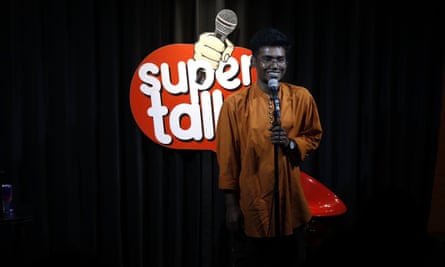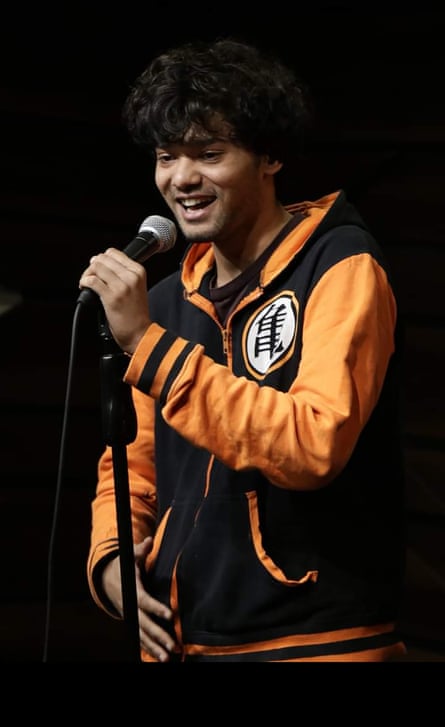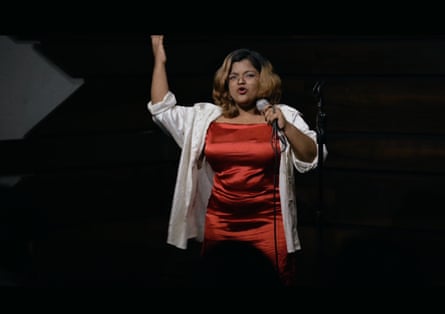On a wooden chair on a makeshift stage at Cat Café Studio, standup comedian Manaal Patil is holding forth to an appreciative Mumbai audience.
In his green striped T-shirt, he may not look like a pioneer, but Patil – who is getting laughs from poking fun at India’s caste system – belongs to the Dalit community, formerly known as “untouchables”.
At the bottom of the hierarchy in the Hindu social structure, Dalits still face discrimination, exclusion and poverty in modern India. In rural and urban areas, Dalits can usually get only menial jobs; many scavenge or clean sewers, even though “untouchability” was officially banned by the Indian constitution in 1950. Upper-caste Indians presume a supremacy over those in the lower layer of India’s entrenched system.
Patil is telling a story about his personal experience. “If you don’t believe me, you can touch me,” he says. “That is why I’m sitting while doing this standup [routine]. I just wanted a reserved seat.”
The audience, who are primarily upper caste, cheer loudly in approval. In India, affirmative action, known colloquially as “the reservation scheme”, officially sets aside nearly half of the seats in educational institutions and government jobs for those from disadvantaged castes. The policy is a sensitive issue, opposed by some in upper castes who argue that it deprives them of opportunities.
The standup comedy scene is dominated by Brahmins (upper-caste Hindus), who have long relied on cultural stereotypes to elicit laughter. Such jokes may be steeped in racism and peppered with casual casteism. Last year, an Indian comedian had to apologise on Twitter for a sexist gag.
“Several comics take a dig at the Dalit community, mocking affirmative action in India or ridiculing their occupations,” says Patil.
But now, a small but lively new wave of Dalit comedians is emerging – turning the tables on being the butt of jokes and using their identity to hit back at the stereotypes and get a laugh on their own terms.
The reactions are not always as approving as Palit’s Cat Café crowd. Some shows have seen confrontation and audiences taking offence. Because of the content of their shows, Dalit comedians are denied access to mainstream platforms and rely on private gigs, performing in bigger cities such as Delhi, Bengaluru, Mumbai.
This also means that they don’t earn much and most have to take second jobs to manage – and to ensure their brand of humour continues.
Manjeet Sarkar
Manjeet Sarkar, 25, peeks through a glass window to look at the stage he will be performing on later, at the SuperTalks comedy studio in New Delhi.
“I didn’t venture into comedy thinking I would bring revolution,” says Sarkar. “I am just telling my story.”
Sarkar comes from Chhattisgarh state’s Bastar district in eastern India, a tribal area that has long been a battleground between far-left Maoist guerrilla fighters, known as Naxalites, and the Indian state. Bastar has a large deployment of security forces from Delhi and the area remains a hotbed of conflict and human rights violations.

Sarkar says atrocities rarely make it to the news because upper-caste Indians believe Dalits get what they deserve. He is only the second person from his village who has gone into higher education. He left his village six years ago to pursue comedy as a career in Mumbai, working as a copywriter to make ends meet.
“I talk about my reality and nobody else can do that,” he says.
Sarkar says he was conditioned to overlook the prejudice he faced in his home village. During the show, he recalls how, as a child, he was told off for drinking water from a public hand-pump. An upper-caste woman cleaned the pump with “Gangajal”, holy water from the Ganges, to “purify” it.
“To get back at her, I touched the Gangajal itself. I was angry, it felt so wrong to think how these practices have been normalised,” says Sarkar.
When Sarkar started telling jokes about caste, he was surprised to see that most people in the audience were upper caste. He believes that’s because people are curious and may be afflicted with what he calls “upper-caste guilt”.
“We are joking about our lived experiences. The crowd might sometimes get wary about how they should react, but it is what it is,” he says.
Sarkar is touring the country with his show, Untouchables, which explores the discrimination he faced as a child and his experiences of growing up in a region troubled by conflict. Sarkar admits that at times he has felt uncomfortable speaking about certain issues but came to realise the only way he could talk about things was to accept them and make them funny.
He draws inspiration from black comics who have loudly called out racism. In college he learned to speak English and began regularly watching shows by the late Patrice O’Neal. “If black comedy can be a thing then so can Dalit comedy,” he says.
Manaal Patil
Manaal Patil, 25, started doing standup comedy in 2015. While applying for college, he became aware of the reserved quota of seats for disadvantaged groups and “backward classes” in India. Patil eventually graduated in advertising with the help of affirmative action.
after newsletter promotion

“The realisation that there is a reserved quota for us, which makes most upper-caste people furious, became a 30-second joke. Over the years, it developed into between 20 and 30 minutes of similar subject matter. Gradually, I started doing Dalit jokes,” he says.
Patil started doing open-mic sessions in Mumbai, where he realised that people who performed well had two things – English education and access to YouTube.
His friends warned him that if he brought caste into his jokes, he would have no commercial future. “There are several barriers to making a name as a comic in India and talking about your struggle as a Dalit seems to be one of them,” he adds.
In February 2022, Patil organised an all-Dalit comedy show called Blue Material – the colour blue is used to represent Dalit resistance. The initiative provides underrepresented comics with larger audiences they might otherwise lack access to.
Blue Material now has seven active participants, as more Dalit comedians have emerged. Their first show, in Dorangos cafe in Mumbai, was a great success.
“We had to pay for spots as nobody was willing to give us extra stage time. We would hardly get five minutes. We thought if we organised a Dalit-themed show, all of us would at least get 30 minutes to perform. It worked well for us,” says Patil.
However, the outcome has not always been so positive. In summer 2022, Blue Material had secured a gig in Goa. The host wanted to see a couple of clips of their performances and after Manaal shared their work he received an email saying they would not be welcome at the venue, because of their content.
“We are looking at humour through a caste lens. We call out the discriminatory practices faced by our community. What most comedians have been doing is called ‘punching down’, where rather than questioning, you are promoting stereotypes. Upper-caste comics used to target us with their jokes. Well, it stops now,” says Patil.
Ankur Tangade
Ankur Tangade, 25, from the city of Beed in Maharashtra state, is a standup comedian and social rights activist. She is involved with the Mahila Kisan Adhikaar Manch (Makaam), a social enterprise working for the rights of women in farming.
When she started in November 2018, she steered clear of jokes about caste and religion, thinking the audience would not like it. “I was trying to be relatable with my content, so I thought if I introduced caste in my jokes, people would not understand me,” she says. However, it never crossed her mind that her identity would hold her back; she believed talent had no caste. She has since changed her outlook.
“Around 10-15 people auditioned for a gig in a production house and there was just one-upper caste person among us. They selected only one person and it was him. What were the odds?” says Tangade.

Those shortlisting the candidates were also upper caste and the idea of not being given an opportunity because of being Dalit outraged her. She says she realised landing a project in a scene dominated by upper-caste comedians would not be easy.
For the corporate gigs, Tangade says, you cannot talk about religion and other “sensitive” issues. She remembers the time when a Muslim comedian was detained after a performance for three weeks, accused of hurting Hindu sentiments. His future shows were cancelled.
Some people have tried to whitewash the most painful aspects of her material, she says. On several occasions audience members have walked up to her, making comments such as: “The world has changed so why are you talking about this?”
But India is seeing an alarming increase in hate crime against the Dalit community.
Before coming out as Dalit in her shows, Tangade came out as queer. She started experimenting with queer content in her routines and gradually included snippets from her experiences of growing up as Dalit in modern India. Her fear of not being understood took a backseat as she realised it was more important to talk about herself, she says, and many people who came to her shows acknowledged her experiences.
“Everyone should just come and listen to what we have to say, and even if you don’t agree, we can talk about it or discuss it,” says Tangade, who met Patil at a show and is now part of Blue Material.
Tangade says she is rooting for a more diverse comedy climate where the voices of the underrepresented are amplified.
“Recently, a friend of mine, who was going to visit me with his mother, told me they wouldn’t drink anything from our cups,” she says. “On asking whether this was because we are Dalit, he said – in a defensive tone – that it was because we were non- vegetarian. As if we eat meat in our cups! People who say casteism has been eradicated from India are living in denial.”
